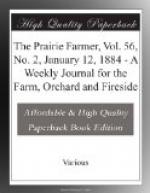“The average cow yields about 450 gallons of milk a year, giving a total product of 6,750,000,000 gallons. Twelve cents a gallon is a fair price to estimate the value of this milk at, a total return to the dairy farmer of $810,000,000. Fifty per cent of the milk is made into cheese and butter. It takes twenty-seven pounds of milk to make one pound of butter, and about ten pounds of milk to make one pound of cheese. There is the same amount of nutrition in three and one half pounds of milk that there is in one pound of beef. A fat steer furnishes fifty per cent of boneless beef, but it would require about 24,000,000 steers, weighing 1,500 pounds each, to produce the same amount of nutrition as the annual milk product does.”
VETERINARY.
ABOUT SOUNDNESS.
It may be supposed that the hackneyed term “sound” is so explicit as to need no comment,—and most people conceive it to be so; but the term “sound” really admits of as much contrariety of opinion as the word “tipsy;” one man considers another so if, at ten at night, he is not precisely as cool and collected as he was at one in the day. Another one calls a man so when he lies on the floor and holds himself on by the carpet. So,—as to soundness, some persons can not see that a horse is unsound, unless he works his flanks like the drone of a bagpipe, or blows and roars like a blacksmith’s bellows; while some are so fastidious as to consider a horse as next to valueless because he may have a corn that he never feels, or a thrush for which he is not, nor likely to be, one dollar the worse.
So far as relates to such hypercritical deciders on soundness, we will venture to say that, if they brought us twenty reported horses in succession, we would find something in all of those produced that would induce such persons to reject them, though, perhaps, not one among the lot had anything about him of material consequence. To say the least, we will venture to assert that nine-tenths of the horses now in daily use are more or less unsound. We make no reservation as to the description of horse, his occupation, or what he may be worth. We scarcely ever had, indeed scarcely ever knew, a horse that had been used, and tried sufficiently to prove him a good one, that was in every particular unequivocally sound. We have no doubt that there are thousands of owners of horses who will at once say we are wrong in this assertion, and would be ready to produce their own horses as undeniable proofs, whereby to back their opinion and refute ours. They may, perhaps, say that their horses are never lame—perhaps not; that is, not lame in their estimation or to their eye; but we daily see horses that go to a certain degree indubitably lame, while their owners conceive them to be as indubitably sound. These horses, perhaps, all do their work perfectly well, are held as sound by owners, servants, acquaintances, and casual observers;




